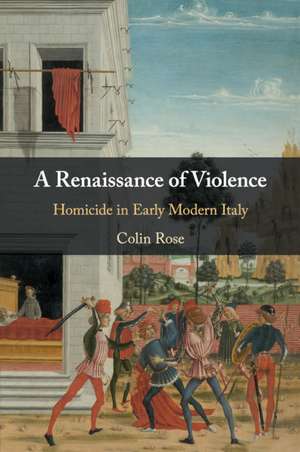A Renaissance of Violence: Homicide in Early Modern Italy
Autor Colin Roseen Limba Engleză Paperback – 14 iul 2021
| Toate formatele și edițiile | Preț | Express |
|---|---|---|
| Paperback (1) | 283.63 lei 6-8 săpt. | |
| Cambridge University Press – 14 iul 2021 | 283.63 lei 6-8 săpt. | |
| Hardback (1) | 586.50 lei 38-45 zile | |
| Cambridge University Press – 16 oct 2019 | 586.50 lei 38-45 zile |
Preț: 283.63 lei
Nou
Puncte Express: 425
Preț estimativ în valută:
54.27€ • 56.66$ • 44.92£
54.27€ • 56.66$ • 44.92£
Carte tipărită la comandă
Livrare economică 04-18 aprilie
Preluare comenzi: 021 569.72.76
Specificații
ISBN-13: 9781108726924
ISBN-10: 1108726925
Pagini: 259
Ilustrații: 38 b/w illus. 2 maps
Dimensiuni: 150 x 229 x 14 mm
Greutate: 0.35 kg
Editura: Cambridge University Press
Colecția Cambridge University Press
Locul publicării:Cambridge, United Kingdom
ISBN-10: 1108726925
Pagini: 259
Ilustrații: 38 b/w illus. 2 maps
Dimensiuni: 150 x 229 x 14 mm
Greutate: 0.35 kg
Editura: Cambridge University Press
Colecția Cambridge University Press
Locul publicării:Cambridge, United Kingdom
Cuprins
1. Introduction; 2. The tower of justice; 3. Homicide in Bologna, 1600–1700; 4. Gender and homicide in early modern Bologna; 5. The days after no future: post-plague homicides in rural Bologna; 6. It's good to have land: the defense of noble privilege through violence; Conclusion.
Recenzii
'Deftly melding new quantitative data with rich qualitative materials, this book adds a little explored 'southern' dimension to debates about how violence declined in modernizing European societies. Alert to the political, institutional, social, and gendered particularities of early modern Bologna, Rose smartly challenges the optimistic hypothesis that homicide readily succumbed to the progress of 'civilization'.' Elizabeth S. Cohen, York University, Toronto
'In this in-depth analysis of homicide cases that followed the catastrophic plague and misery of 1630, Rose unravels the cultural and political fabric of an intractable Bolognese nobility, shedding important light on how local elites resisted the centralizing and pacifying attempts of an early modern state.' Joanne M. Ferraro, San Diego State University and author of Venice: History of the Floating City
'With archival precision and narrative skill, Rose reveals a society in crisis and those who make killing a strategy for living. Plague, famine, and violence unravel an ineffective and illegitimate government, and trigger civil war as the Bolognese seek their own solutions with knives and guns.' Nicholas Terpstra, University of Toronto
'Colin Rose's compelling analysis of seventeenth-century Bologna shows how easily a peaceful society can degenerate into a society of murderers. This marvellous book erodes the notion that modern Western societies are on a trajectory toward ever less personal violence.' Edward Muir, Northwestern University, Illinois
'… a riveting contribution to the historiography on interpersonal violence in the early modern world… This book is a highly recommended read for anyone interested in the history Italy, violence and peace-making, and the relationship between people and criminal courts in the early modern world.' Sanne Muurling, Crime, History & Societies
'… an excellent orientation for those beginning the study of interpersonal violence … specialists will appreciate this decisive contribution to the debate on the decline of violence. Rose shows how civilization and violence, far from being mutually exclusive, work together.' Umberto Cecchinato, Annali Recensioni Online
'In this in-depth analysis of homicide cases that followed the catastrophic plague and misery of 1630, Rose unravels the cultural and political fabric of an intractable Bolognese nobility, shedding important light on how local elites resisted the centralizing and pacifying attempts of an early modern state.' Joanne M. Ferraro, San Diego State University and author of Venice: History of the Floating City
'With archival precision and narrative skill, Rose reveals a society in crisis and those who make killing a strategy for living. Plague, famine, and violence unravel an ineffective and illegitimate government, and trigger civil war as the Bolognese seek their own solutions with knives and guns.' Nicholas Terpstra, University of Toronto
'Colin Rose's compelling analysis of seventeenth-century Bologna shows how easily a peaceful society can degenerate into a society of murderers. This marvellous book erodes the notion that modern Western societies are on a trajectory toward ever less personal violence.' Edward Muir, Northwestern University, Illinois
'… a riveting contribution to the historiography on interpersonal violence in the early modern world… This book is a highly recommended read for anyone interested in the history Italy, violence and peace-making, and the relationship between people and criminal courts in the early modern world.' Sanne Muurling, Crime, History & Societies
'… an excellent orientation for those beginning the study of interpersonal violence … specialists will appreciate this decisive contribution to the debate on the decline of violence. Rose shows how civilization and violence, far from being mutually exclusive, work together.' Umberto Cecchinato, Annali Recensioni Online
Notă biografică
Descriere
This in-depth analysis of homicide patterns in seventeenth-century Italy explores the social contexts behind a sharp rise in interpersonal violence.
